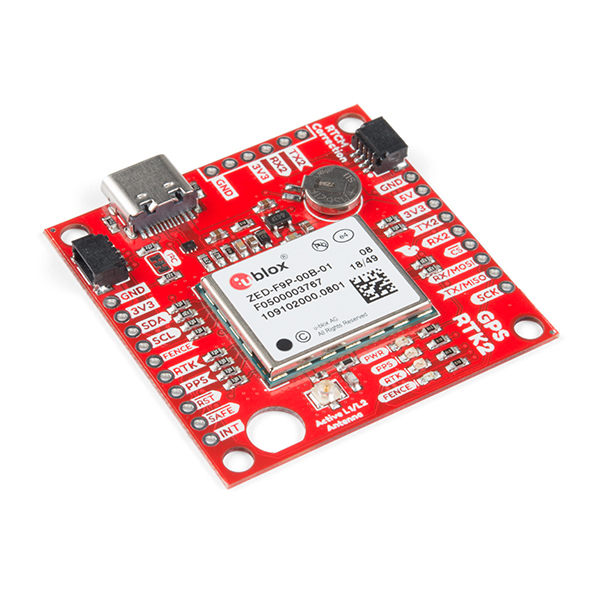 |
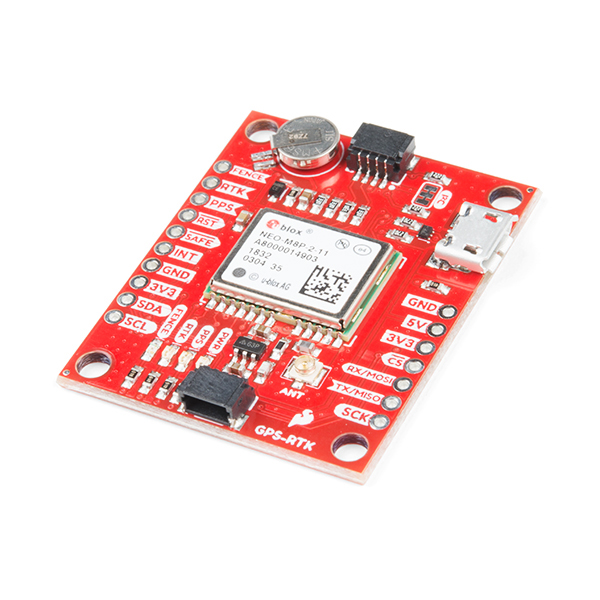 |
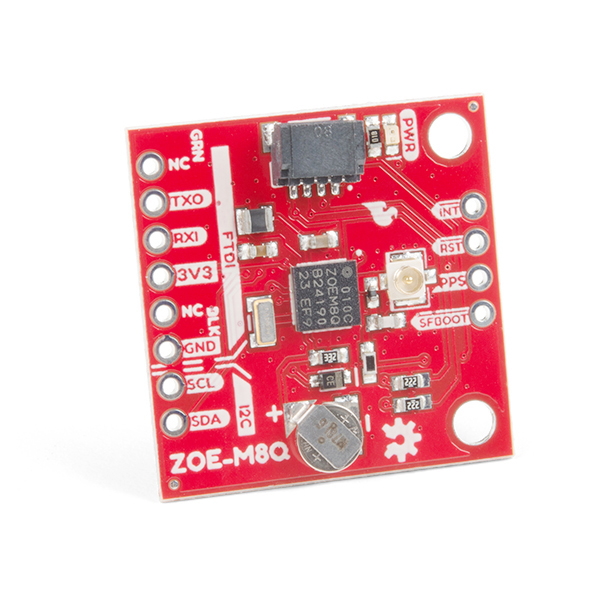 |
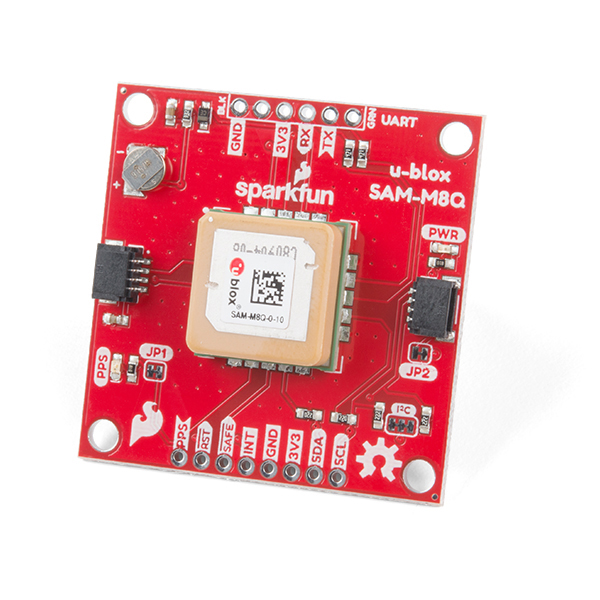 |
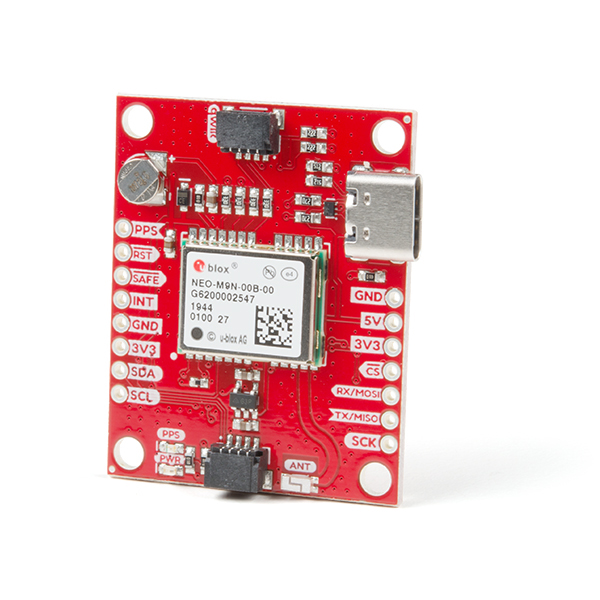 |
| SparkFun GPS-RTK2 - ZED-F9P (GPS-15136) | SparkFun GPS-RTK - NEO-M8P-2 (GPS-15005) | SparkFun ZOE-M8Q Breakout (GPS-15193) | SparkFun SAM-M8Q Breakout (GPS-15210) | SparkFun NEO-M9N Breakout (GPS-15733) |
u-blox makes some incredible GNSS receivers covering everything from low-cost, highly configurable modules such as the SAM-M8Q all the way up to the surveyor grade ZED-F9P with precision of the diameter of a dime. This library focuses on configuration and control of u-blox devices over I2C (called DDC by u-blox) and Serial. The UBX protocol is supported over both I2C and serial, and is a much easier and lighterweight interface to a GNSS module. Stop polling messages and parsing NMEA data! Simply ask for the datums you need and receive an automatic callback when they arrive.
This library can be installed via the Arduino Library manager. Search for SparkFun u-blox GNSS.
This library is the new and improved version of the very popular SparkFun u-blox GNSS Arduino Library. v2.0 contains some big changes and improvements:
- Seamless support for "automatic" message delivery:
- In v1.8, you could ask for the NAV PVT (Navigation Position Velocity Time) message to be delivered automatically, without polling. v2.0 adds automatic support for 23 messages, covering the full range of: standard and High Precision position, velocity and time information; relative positioning; event capture with nanosecond time resolution; raw GNSS signal data including carrier phase; Sensor Fusion; and High Navigation Rate data.
- Dynamic memory allocation with clearly-defined data storage structs for each message:
- There are no static 'global' variables to eat up your RAM. v2.0 automatically allocates memory for the automatic messages when they are enabled. You may find your total RAM use is lower with v2.0 than with v1.8.
- Each "auto" message has a clearly-defined data storage struct which follows the u-blox protocol specification precisely.
- Callbacks:
- No more polling! Simply request the "auto" messages you need and receive an automatic callback when each message arrives.
- Please see the callback examples for more details.
- Built-in support for data logging:
- Want to log RXM SFRBX and RAWX data for Post-Processed Kinematics or Precise Point Positioning? You can absolutely do that! v2.0 provides built-in support for data logging, allowing you to log any of the "auto" messages simply and easily.
- Incoming "auto" data can be stored in a configurable ring buffer. You can then extract the data from the buffer and write it to (e.g.) SD card using your favorite SD library.
- Data is logged in u-blox UBX format which is compact and efficient. You can replay the data using u-center.
- Please see the data logging examples for more details.
Migrating to v2.0 is easy. There are two small changes all users will need to make:
- The name of the library class has changed from
SFE_UBLOX_GPStoSFE_UBLOX_GNSSto reflect that the library supports all of the Global Navigation Satellite Systems:- As a minimum, you need to change:
SFE_UBLOX_GPS myGPS; - to:
SFE_UBLOX_GNSS myGPS; - But we would encourage you to use
SFE_UBLOX_GNSS myGNSS;. You will see that all of the library examples now usemyGNSSinstead ofmyGPS.
- As a minimum, you need to change:
- The name of the library header and C++ files have changed too:
- Change:
#include <SparkFun_Ublox_Arduino_Library.h> - to:
#include <SparkFun_u-blox_GNSS_Arduino_Library.h>
- Change:
If you are using the Dead Reckoning Sensor Fusion or High Dynamic Rate messages, you will need to make more small changes to your code. Please see the dead reckoning examples for more details. There is more detail available in Theory.md if you need it.
To achieve 400kHz I2C speed please be sure to remove all pull-ups on the I2C bus. Most, if not all, u-blox modules include internal pull ups on the I2C lines (sometimes called DDC in their manuals). Cut all I2C pull up jumpers and/or remove them from peripheral boards. Otherwise, various data glitches can occur. See issues 38 and 40 for more information. If possible, run the I2C bus at 100kHz.
If you would like to contribute to this library: please do, we truly appreciate it, but please follow these guidelines. Thanks!
- /examples - Example sketches for the library (.ino). Run these from the Arduino IDE.
- /src - Source files for the library (.cpp, .h).
- keywords.txt - Keywords from this library that will be highlighted in the Arduino IDE.
- library.properties - General library properties for the Arduino package manager.
- CONTRIBUTING.md - Guidelines on how to contribute to this library.
- Theory.md - provides detail on how data is processed by the library.
- /Utils - contains a Python utility which can check the contents of UBX log files.
- Installing an Arduino Library Guide - Basic information on how to install an Arduino library.
If you would like to learn more about how this library works, including the big changes we made in version 2.0, please see Theory.md for full details.
- GPS-16481 - SparkFun GPS-RTK-SMA Breakout - ZED-F9P (Qwiic)
- GPS-15136 - SparkFun GPS-RTK2 Board - ZED-F9P (Qwiic)
- GPS-16344 - SparkFun GPS-RTK Dead Reckoning Breakout - ZED-F9R (Qwiic)
- GPS-15005 - SparkFun GPS-RTK Board - NEO-M8P-2 (Qwiic)
- GPS-15210 - SparkFun GPS Breakout - Chip Antenna, SAM-M8Q (Qwiic)
- GPS-15193 - SparkFun GPS Breakout - Chip Antenna, ZOE-M8Q (Qwiic)
- GPS-17285 - SparkFun GPS Breakout - NEO-M9N, SMA (Qwiic)
- GPS-15733 - SparkFun GPS Breakout - NEO-M9N, Chip Antenna (Qwiic)
- GPS-15712 - SparkFun GPS Breakout - NEO-M9N, U.FL (Qwiic)
- GPS-16329 - SparkFun GPS Dead Reckoning Breakout - NEO-M8U (Qwiic)
- SPX-14980 - SparkX GPS-RTK Black
- SPX-15106 - SparkX SAM-M8Q
This product is open source!
Various bits of the code have different licenses applied. Anything SparkFun wrote is beerware; if you see me (or any other SparkFun employee) at the local, and you've found our code helpful, please buy us a round!
Please use, reuse, and modify these files as you see fit. Please maintain attribution to SparkFun Electronics and release anything derivative under the same license.
Distributed as-is; no warranty is given.
- Your friends at SparkFun.
